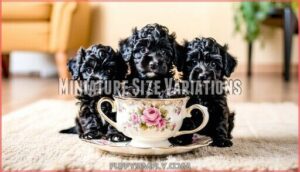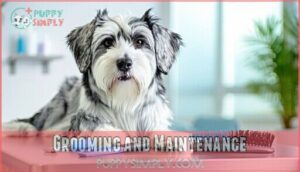This site is supported by our readers. We may earn a commission, at no cost to you, if you purchase through links.
 You’re looking at one of the dog world’s hidden treasures when you spot a black goldendoodle.
You’re looking at one of the dog world’s hidden treasures when you spot a black goldendoodle.
These striking pups are like finding a four-leaf clover – they show up in less than 5% of litters due to recessive genetics that’d make your high school biology teacher proud.
Your black goldendoodle combines a Golden Retriever’s heart-melting personality with a Poodle’s brain power, all wrapped in a gorgeous jet-black coat that turns heads at the dog park.
They’re still the same lovable, trainable companions you’d expect from any goldendoodle, just rarer than hen’s teeth.
The genetics behind their stunning appearance reveal fascinating breeding secrets.
Table Of Contents
- Key Takeaways
- Black Goldendoodle Genetics
- Black Coat Color Rarity
- Coat Types and Grooming
- Size and Physical Characteristics
- Temperament and Training
- Black Goldendoodle Popularity
- Health and Wellness
- Grooming and Maintenance
- Black Goldendoodle Costs
- Black Goldendoodle Ownership
- Frequently Asked Questions (FAQs)
- Is a black Goldendoodle rare?
- Are black Goldendoodles good dogs?
- Can you get black Goldendoodles?
- What is the lifespan of a black Goldendoodle?
- What is the life expectancy of a Black Goldendoodle?
- Are Black Goldendoodles hypoallergenic?
- What is the difference between an F1 and F2 Goldendoodle?
- Is it easy to train a Black Goldendoodle?
- How much exercise does a Black Goldendoodle need?
- Do black Goldendoodles change color with age?
- Conclusion
Key Takeaways
- You’ll find black Goldendoodles are rare gems appearing in less than 5% of litters due to recessive genetics, with F1B generations offering your best chance of finding one since they carry 75% Poodle genetics.
- You’re looking at a high-maintenance beauty that’ll need daily brushing for curly coats, professional grooming every 6-8 weeks, and an annual budget of $2,000-4,000 for ongoing care including vet bills and quality grooming.
- You’ll get an intelligent, trainable companion that’s perfect for families with allergies since they combine the Golden Retriever’s gentle temperament with the Poodle’s hypoallergenic, low-shedding coat and problem-solving skills.
- You can expect your black Goldendoodle to live 10-15 years and adapt well to various living situations, but they’ll need 30-60 minutes of daily exercise and mental stimulation to prevent destructive behaviors from boredom.
Black Goldendoodle Genetics
Understanding your black Goldendoodle’s genetics helps explain why these stunning dogs aren’t as common as their lighter-colored cousins.
You’ll discover that black coats result from specific gene combinations inherited from the Poodle parent, making F1B generations more likely to produce these beautiful dark-coated companions.
Recessive Gene Influence
Understanding your black goldendoodle‘s stunning coat involves diving into fascinating canine genetics.
The black coat results from specific recessive gene patterns, where both parents must carry the dominant black gene (B) for offspring to display this striking color.
Black Goldendoodles are also known for their hypoallergenic qualities, making them suitable for allergy sufferers.
- Golden Retrievers carry double-recessive (e/e) genes that normally block black pigment production
- Mixing with Poodle genetics carrying (E/e) or (E/E) allows black coat color inheritance to emerge
- F1B genetics increase chances through stronger Poodle gene dominance and eumelanin expression
- Coat color genetics can shift over time as dilute genes potentially lighten pigmentation
Poodle Parent Contribution
The Poodle parent basically holds the genetic keys to your black goldendoodle’s stunning appearance.
The eumelanin source from Poodles creates that rich, dark coloring you’re after, as black coat genes from Poodles carry dominant alleles that override Golden Retriever’s lighter tones.
While Golden Retrievers contribute recessive traits, the Poodle’s coat type influence determines whether you’ll get those coveted deep coat colors and distinct coat patterns.
F1B Goldendoodle Rarity
F1B Goldendoodles pack 75% Poodle genetics, making black coat colors more likely than their F1 cousins.
F1B Goldendoodles: Where 75% Poodle genetics unlock those coveted black coats you’ve been searching for.
This F1B definition explains why breeder specialization matters—you’ll find reputable breeders who understand how the recessive gene works.
Black color dominance increases in these second-generation crosses, boosting desirability factors. Your black goldendoodle’s coat color change becomes less unpredictable with higher Poodle percentages.
Black Coat Color Rarity
You’ll find black Goldendoodles are actually more common than many people think, though finding one might require some patience since fewer breeders specialize in this striking color.
The black coat results from specific genetic combinations involving eumelanin and the dominant K locus gene, which means you’re more likely to encounter them in later generations like F1B or F2 crosses.
Limited Breeder Availability
Finding a black goldendoodle breeder who’s truly reputable isn’t like picking up groceries at the corner store.
Most breeders focus on cream and golden coats because that’s where the money flows. You’ll face limited options, which drives up black goldendoodle price and creates longer waiting lists for quality puppies.
- Breeder demand skyrockets when ethical breeding meets rare color genetics
- Puppy mills exploit this scarcity, making breeder selection absolutely critical
- Genetic testing becomes your safety net against heartbreak and vet bills
Genetic Inheritance Patterns
Black coat genetics follow predictable patterns across generations.
You’ll find F1B and later generations produce more black puppies than F1 crosses.
Dominant alleles from Poodle parents control eumelanin production, while recessive traits affect pheomelanin levels.
Generation impact matters – second and third-generation breedings show higher success rates for black coloration through canine genetics inheritance patterns.
Eumelanin and K Locus Gene
Your black goldendoodle’s stunning coat comes from eumelanin, the pigment responsible for dark colors.
The KB allele at the K locus dominance controls this melanin production, creating that rich black appearance. When you’re considering breeding strategies or genetic testing, understanding these mechanisms helps predict coat color intensity in future generations.
Coat color in dogs is determined by genes controlling pigment production and distribution.
Here’s how eumelanin expression works in your pup:
- KB Allele Dominance – This genetic variant blocks other color patterns, allowing pure black pigmentation to shine through your dog’s entire coat
- Melanin Production Control – Eumelanin creates the deep, rich black goldendoodle colors you see, while pheomelanin would produce lighter tones
- Breeding Predictability – Genetic testing reveals which dogs carry the KB allele, helping breeders develop more accurate breeding strategies for black offspring
Coat Types and Grooming
Your black Goldendoodle’s coat can take three distinct forms, each requiring different levels of care to keep it healthy and tangle-free.
Understanding whether you’re dealing with straight, wavy, or curly fur will help you establish the right grooming routine and prevent those dreaded mats that seem to appear overnight.
Straight Coat Characteristics
When you’re lucky enough to find the rarest Goldendoodle coat, you’ll discover straight-haired black goldendoodles mirror their Golden Retriever parent’s appearance with longer fur throughout their body.
This straight coat texture offers easy maintenance compared to curlier varieties, requiring only weekly brushing sessions.
The predominant genes from the Retriever side create minimal coat shedding, though proper coat grooming prevents tangles and maintains their sleek, flowing appearance.
Regular grooming requires a specialized Goldendoodle brush to prevent matting.
Shaggy Wavy Coat Maintenance
Among all coat grooming options, the shaggy wavy texture strikes that perfect balance between beauty and practicality.
You’ll find this coat maintenance surprisingly manageable with weekly brushing techniques using a slicker brush.
Detangling tips include working from ends upward, while proper product selection keeps shedding control simple.
Consider buying a new brush for ideal grooming.
Your grooming schedule stays flexible, and coat grooming frequency remains reasonable for busy families, allowing for practicality in your daily routine.
Curly Coat Requirements
High-maintenance curly coats demand your daily brushing commitment to prevent stubborn mats from forming.
You’ll need professional trimming every six to eight weeks for proper coat length management. Mat prevention requires careful product selection—invest in quality detangling sprays and slicker brushes.
A quality coat product can make a big difference. Your at-home grooming routine between professional grooming sessions keeps your black Goldendoodle’s coat maintenance manageable and healthy.
Size and Physical Characteristics
You’ll find black Goldendoodles come in three distinct size categories, ranging from compact 15-pound miniatures to impressive 100-pound standards that can tower over most other dogs.
Understanding these size variations helps you choose the perfect match for your living space and lifestyle, whether you’re looking for a lap-sized companion or a gentle giant who’ll need room to stretch those long legs.
Miniature Size Variations
Compactness defines the mini black goldendoodle’s charm. You’ll find these pint-sized companions weigh between 15-30 pounds and stand 13-20 inches tall, making them perfect apartment buddies.
- Teacup Goldendoodles weigh under 15 pounds with delicate frames
- Mini Weight varies substantially based on breeder variations and parent size
- Height Differences range from 13-20 inches at shoulder measurement
- Growth Rate reaches maturity around 12-16 months of age
- Size consistency depends on responsible breeding practices and genetic selection
Standard Size Range
Standard black goldendoodles hit the sweet spot for many families.
Your full grown black goldendoodle will typically stand 17-24 inches tall and weigh 50-90 pounds.
Size inheritance from both parent breeds creates height variation, but most dogs follow predictable growth timelines.
By 12-16 months, you’ll see their final black goldendoodle size emerge, meeting general breed standard expectations perfectly, with a predictable outcome.
Large Size Expectations
When your black goldendoodle reaches the large category, you’re looking at a gentle giant.
These impressive dogs typically weigh 45-100 pounds and stand 22-26 inches tall when black goldendoodle full grown.
Their growth timeline spans 12-16 months, requiring substantial space needs and higher exercise requirements.
Adult weight directly impacts feeding costs, so budget accordingly for your supersized companion’s appetite.
Temperament and Training
You’ll find your black Goldendoodle’s intelligence and enthusiasm to please make training sessions surprisingly rewarding.
Their people-loving nature means you’ll need to address potential separation anxiety early.
Their smart, gentle temperament responds best to positive reinforcement methods, and with consistent training, they’ll quickly become the well-mannered family companion you’re hoping for.
Intelligent and Trainable
Your black goldendoodle’s intelligence shines through their enthusiasm to learn new commands and tricks.
Your black goldendoodle’s eagerness to please transforms every training session into a joyful partnership of learning and bonding.
These smart pups combine Golden Retriever loyalty with Poodle problem-solving skills, making dog training sessions feel like collaborative adventures.
Their trainability means they’ll quickly master basic obedience and complex behaviors.
Positive reinforcement training is particularly effective with Goldendoodles.
Mental stimulation through puzzle toys and varied training techniques keeps their sharp minds engaged and prevents boredom-related mischief, which is a key aspect of their mental stimulation.
Positive Reinforcement Methods
Given your black goldendoodle’s remarkable intelligence and trainability, positive reinforcement transforms training sessions into enjoyable bonding experiences.
These smart pups respond beautifully when you reward good behavior rather than focusing on mistakes.
Effective positive reinforcement techniques include:
- Treat Motivation – Use high-value rewards like small training treats or favorite toys
- Clicker Training – Mark desired behaviors instantly with consistent timing
- Shaping Behavior – Break complex commands into smaller, achievable steps
Separation Anxiety Prevention
You’ll want to start early socialization and crate training with your black goldendoodle to prevent separation anxiety from taking root.
These people-oriented dogs form strong bonds, making them prone to distress when alone.
Gradual desensitization works wonders—start with short departures and slowly increase time away.
Meeting their exercise needs and providing mental stimulation before leaving helps tremendously.
Black Goldendoodle Popularity
You’ll find that black Goldendoodles have gained tremendous popularity among dog owners who want a striking, low-shedding companion that stands out from the typical golden varieties.
Their unique jet-black coats, combined with hypoallergenic qualities and gentle temperaments, make them especially appealing to families with allergies who don’t want to compromise on having a beautiful, intelligent pet.
They offer a great option for those seeking a low-shedding companion, making them a preferred choice for many.
Unique Appearance Appeal
You’ll fall head over heels for your black Goldendoodle’s stunning looks. Their striking contrast against lighter surroundings makes heads turn everywhere you go.
Eye color typically ranges from warm brown to deep amber, perfectly complementing their dark coat. While coat color may experience subtle lightening over time, these defining features create an undeniably elegant appearance that sets them apart from typical rare colors in designer dogs.
These dogs benefit from increased genetic diversity, potentially reducing some inherited health risks. This aspect, combined with their unique looks, makes them a desirable choice, offering a beautiful combination of aesthetics and genetic advantages.
Low Shedding Advantage
You’ll love how your black goldendoodle’s coat types create minimal vacuuming chores around your home.
Their Poodle genetics contribute to this coat maintenance advantage, reducing loose hair on furniture and clothing.
Black goldendoodle shedding stays remarkably low compared to traditional breeds, making daily cleanup a breeze.
This breed suitability works perfectly for busy families who want a beautiful companion without constant hair removal hassles, due to the low shedding and beautiful companion qualities.
Hypoallergenic Benefits
Black goldendoodles offer real hope for allergy sufferers thanks to their Poodle genetics.
Their dense, curly coats trap dander close to the skin, dramatically reducing airborne allergens.
While no dog is completely hypoallergenic, these pups excel at dander reduction and allergen control.
You’ll find their low shedding levels make managing pet allergies much easier than traditional breeds.
Health and Wellness
Your black Goldendoodle’s health depends on understanding the genetic risks they inherit from both Golden Retriever and Poodle parents, including hip dysplasia, eye conditions, and heart issues.
Regular veterinary checkups, preventive care, and knowing the warning signs of common health problems will help you keep your furry companion happy and healthy throughout their 10-15 year lifespan.
Effective management of these health aspects, including recognizing the signs of common health problems, is crucial for ensuring your Goldendoodle leads a long and healthy life.
Common Health Issues
Your black goldendoodle faces several common health issues you’ll want to watch for.
Hip dysplasia affects joints, causing mobility problems as they age. Progressive atrophy can impact their vision over time.
Bloat risk increases with their size, especially after eating. Ear infections happen frequently due to their floppy ears.
Patellar luxation and other joint problems also occur regularly in this breed. Regular vet visits can help with early detection of cancer, which is crucial for their overall health and can aid in early detection.
Genetic Disorder Risks
Understanding your black Goldendoodle’s genetic predispositions helps you stay ahead of potential problems.
Hip Dysplasia and Elbow Dysplasia affect joint function, while Progressive Atrophy can cause blindness.
Heart Conditions, Von Willebrands disease, and Addisons disease are serious concerns.
Eye diseases and other common health issues may surface.
Genetic health testing before breeding helps identify carriers and reduce risks, addressing concerns like Hip Dysplasia and Heart Conditions.
Regular Veterinary Care
While genetics play a role in your black goldendoodle’s health, proactive veterinary care makes all the difference.
Regular checkups help catch problems early and keep your pup thriving throughout their 10-15 year lifespan.
- Vaccination Schedules: Follow your vet’s timeline for core vaccines and boosters
- Parasite Prevention: Monthly treatments protect against fleas, ticks, and heartworms
- Dental Health: Annual cleanings prevent painful tooth decay and gum disease
- Weight Management: Monitor body condition to avoid joint stress and diabetes
Grooming and Maintenance
Your black Goldendoodle’s gorgeous coat requires consistent care to prevent matting and maintain its healthy appearance.
You’ll need to brush regularly and schedule professional grooming sessions to keep your pup looking their best while avoiding painful tangles and skin problems.
Regular Brushing Needs
Your black goldendoodle’s coat health depends on consistent brushing frequency—aim for three times weekly to prevent mats from forming.
Start puppy brushing early to build positive habits. Choose proper coat grooming tools like slicker brushes and metal combs for effective mat prevention.
Following a regular coat grooming schedule with these coat grooming tips keeps your pup’s fur healthy and manageable.
Professional Grooming Requirements
Professional black goldendoodle grooming typically requires visits every 6-8 weeks to maintain their signature look.
Coat grooming professionals use specialized shampoos and grooming tools to achieve perfect coat styling while managing costs effectively.
Essential grooming services include:
- Full-body trimming with breed-specific cuts
- Nail clipping and ear cleaning
- Sanitary trimming around sensitive areas.
Establishing a consistent coat grooming schedule prevents overwhelming maintenance between appointments.
Matting and Skin Issue Prevention
You’ll prevent most matting disasters by mastering proper brushing techniques and using quality coat grooming products weekly.
Choose gentle shampoo selection that won’t irritate sensitive skin, as diet impact affects coat health substantially.
Professional grooming every 6-8 weeks helps avoid costly dematting fees.
Monitor for allergy management signs like excessive scratching, which creates coat grooming challenges requiring immediate attention.
Black Goldendoodle Costs
You’ll find that black Goldendoodle puppies typically cost between $1,500 and $3,000, with prices varying based on the breeder’s reputation, location, and the dog’s lineage.
Beyond the initial purchase price, you should budget for ongoing expenses like grooming, veterinary care, food, and supplies, which can add up to $1,200 to $2,000 annually.
Puppy Price Range
Black goldendoodle puppy prices typically range from $1,500 to $4,000, making your initial investment substantial.
Breeder reputation considerably influences black goldendoodle cost, with established breeders commanding premium prices. Adoption can be a more affordable option, but initial costs still apply.
- Location impact: Urban areas often see higher puppy prices than rural regions
- Included costs: Some breeders include vaccinations, microchipping, and health screenings
- Price fluctuation: Seasonal demand affects black goldendoodle for sale listings substantially
Expenses and Ownership Costs
Beyond puppy prices, you’ll face ongoing expenses throughout your black goldendoodle’s life.
Monthly expenses include quality dog food ($50-80), vet bills for routine care ($100-300 annually), and grooming costs every 6-8 weeks ($75-150).
Training fees, pet insurance, toys, and supplies add up quickly.
Your initial investment continues with these essential ownership costs totaling $2,000-4,000 yearly.
Breeder Reputation and Quality
Finding a reputable breeder separates quality black goldendoodle puppies from puppy mills and backyard breeders.
Ethical breeding practices include genetic testing, health guarantees, and proper puppy socialization.
Experienced breeders maintain relationships with veterinarians and provide transparency about their breeding protocols, prioritizing health clearances over profit.
Reputable sources ensure you’ll receive a well-bred companion from trusted hands, ensuring a positive experience for both you and your new pet.
Black Goldendoodle Ownership
You’ll find that black Goldendoodles adapt well to various living situations, from apartments to large homes, as long as you provide daily exercise and mental stimulation.
These intelligent, family-friendly dogs thrive with active owners who can meet their grooming needs and appreciate their gentle, trainable nature.
Family Pet Suitability
You’ll find that black goldendoodles make exceptional family pets, blending intelligent minds with affectionate hearts.
Their family-friendly temperament shines through these key traits:
- Kid Compatibility – Gentle, patient nature with children of all ages
- Activity Levels – Energetic enough for active families, calm indoors
- Socialization Needs – Thrives with human interaction and family bonding
- Training Ease – Quick learners who respond well to consistent guidance
- Family Allergies – Low-shedding coats accommodate sensitive household members
Apartment Living Compatibility
Most black Goldendoodles adapt surprisingly well to apartment living despite their size.
Their mellow temperament keeps noise levels manageable, though early socialization prevents excessive barking.
Medium-sized dogs need daily exercise to manage energy levels, but they’re generally apartment-friendly.
You’ll find their breed adaptability shines when exercise needs are met through walks and mental stimulation.
Active Lifestyle Requirements
Your black goldendoodle isn’t built for couch-potato life.
These energetic pups need daily walks, runs, or hiking adventures to match their high energy levels.
Mental stimulation through puzzle toys and training sessions keeps their sharp minds engaged.
Their natural sociability means regular playdates with other dogs aren’t just fun—they’re necessary, making them an active companion, not lap dog.
Frequently Asked Questions (FAQs)
Is a black Goldendoodle rare?
While you might think these ebony beauties are uncommon, they’re actually not that rare.
You’ll find them more easily in later generations like F1B crosses, though they’re less advertised than lighter-colored pups.
Are black Goldendoodles good dogs?
Nearly 95% of Goldendoodle owners report high satisfaction with their pets.
You’ll find black Goldendoodles make excellent companions—they’re intelligent, gentle with kids, highly trainable, and perfect for active families seeking loyal, low-shedding dogs.
Can you get black Goldendoodles?
Yes, you can absolutely get black Goldendoodles.
They’re produced when breeders use black Poodles in their breeding programs.
While less common than cream or golden colors, they’re increasingly popular and available.
What is the lifespan of a black Goldendoodle?
Looking for a lifetime companion? Searching for lasting love? Hoping for years of joy?
Your black Goldendoodle will typically live 10-15 years, matching their Golden Retriever and Poodle parents’ lifespans perfectly.
What is the life expectancy of a Black Goldendoodle?
Your Black Goldendoodle’s life expectancy typically ranges from 10-15 years.
They’re generally healthy dogs, but their lifespan depends on genetics, diet, exercise, and regular veterinary care you provide throughout their lives, which can significantly impact their overall lifespan.
Are Black Goldendoodles hypoallergenic?
Like a sweater that doesn’t make you sneeze, these pups inherit low-shedding coats from their Poodle parent. You’ll find they’re generally hypoallergenic, though no dog is 100% allergen-free for everyone.
What is the difference between an F1 and F2 Goldendoodle?
F1 Goldendoodles are first-generation crosses (50% Golden Retriever, 50% Poodle).
F2s are second-generation (F1 x F1), while F2s have more unpredictable traits since they’re further from the original parent breeds.
Is it easy to train a Black Goldendoodle?
Training your furry genius won’t break a sweat!
You’ll discover they’re incredibly intelligent and keen to please.
With positive reinforcement and consistency, they’ll master commands quickly, making obedience training feel like a breeze, using consistency to achieve great results.
How much exercise does a Black Goldendoodle need?
Your energetic pup needs about 30-60 minutes of daily exercise to stay happy and healthy.
Think walks, fetch sessions, or swimming adventures.
Without enough activity, they’ll find their own mischievous ways to burn energy.
Do black Goldendoodles change color with age?
Yes, your black Goldendoodle’s coat will likely lighten as they mature.
The dilute gene can turn that gorgeous black fur into stunning shades of gray or silver, creating a beautiful transformation you’ll love watching unfold.
Conclusion
Finding a black goldendoodle is like discovering a diamond in the rough – these rare beauties require dedicated care but reward you with unmatched loyalty and intelligence.
You’ll invest in regular grooming, training, and health maintenance, but their hypoallergenic coats and gentle temperaments make them exceptional family companions.
Whether you’re living in an apartment or have acres to roam, your black goldendoodle will adapt beautifully to your lifestyle while bringing joy to every day.
- https://www.mspca.org/angell_services/canine-sebaceous-adenitis/
- https://vcahospitals.com/know-your-pet/addisons-disease-in-dogs-overview
- https://www.goldendoodleassociation.com/about-the-breed/coat-types-and-colors/
- https://www.teddybeargoldendoodles.com/goldendoodles/f1b-english-goldendoodles
- http://www.dogbreedslist.info/all-dog-breeds/Goldendoodle.html



















